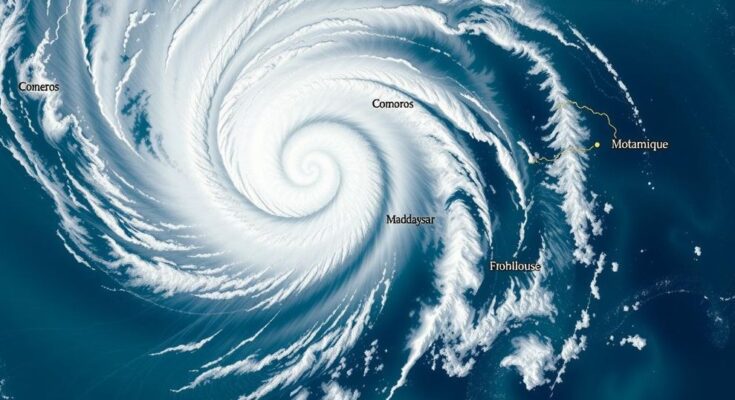Cyclone Chido is approaching Comoros, Madagascar, Mayotte, and Mozambique, bringing strong winds and heavy rain. Authorities are closing schools, issuing red alerts, and mobilizing emergency resources as preparations intensify. Over two million people could face impacts from the storm, with risks including flooding and disease outbreaks. The situation underscores the need for community vigilance as the cyclone season progresses.
Cyclone Chido, a formidable tropical storm, is advancing towards the islands of Comoros, Madagascar, and Mayotte, as well as the mainland of Africa, specifically Mozambique. This cyclone is anticipated to deliver intense winds and substantial rainfall, thereby posing a considerable threat to these regions. Authorities in Comoros have responded preemptively by closing schools, with expectations for landfall in the early hours of Saturday. Concurrently, the French territory of Mayotte remains vigilant, having received a red alert from the French national weather service.
In Mozambique, a red alert has been issued for the northern provinces of Cabo Delgado and Nampula, potentially impacting over two million individuals due to the cyclone’s approach. The Mozambique National Meteorological Institute predicts winds may reach speeds of up to 200 kilometers per hour (124 miles per hour) during landfall. Madagascar is also preparing, with warnings distributed to residents and evacuations underway in the most vulnerable northern regions. Since Tuesday, local authorities have been supplying food and emergency equipment to mitigate the storm’s impact.
French government officials are mobilizing resources to support Mayotte in the event of significant damage caused by Cyclone Chido. Emergency personnel and necessary equipment are being deployed to facilitate rescue and recovery efforts in anticipation of the expected devastation.
Experts in climate science have expressed concern over increasingly intense cyclones in these regions, attributing this trend to climate change. Cyclone Chido threatens to induce serious flooding, landslides, and outbreaks of waterborne diseases, heightening the urgency for community preparedness. As the cyclone season progresses, residents are advised to remain vigilant and take precautionary measures to safeguard their well-being.
Cyclone Chido underscores the growing threat of extreme weather patterns in the Indian Ocean region, particularly affecting vulnerable nations like Comoros, Madagascar, and Mozambique. This phenomenon is exacerbated by climate change, which intensifies the severity and frequency of tropical storms. Local authorities are tasked with ensuring public safety and preparedness, especially since these storm systems can lead to profound consequences, including environmental disasters and public health crises. The ongoing cyclone season highlights the critical need for effective disaster management strategies and community awareness to mitigate risks and enhance resilience against natural disasters.
In summary, Cyclone Chido poses a serious threat to the islands of Comoros, Madagascar, Mayotte, and the mainland of Mozambique. With authorities mobilizing resources and implementing safety measures, the emphasis on preparedness is paramount as communities brace for the storm’s potential impacts. As climate change contributes to the increasing intensity of cyclones, it is imperative for residents to stay informed and undertake necessary precautions to ensure their safety.
Original Source: www.inkl.com




